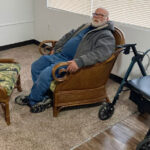
Sister Mary Bea Snyder, CHM, returned last week from San Juan, Texas, just 10 miles north of the Mexican border, where she served immigrant families awaiting transit to their new homes in the U.S. They have permission to be in the U.S. because they have sponsors. She played with their young children, made sandwiches for the departing families, sorted and bagged clothing for the immigrants who left their Central American homelands because of poverty, violence or other hardships. Many others, fleeing for the same reasons but do not have sponsors, face a perilous and uncertain future.
“We need to do a lot more to help our brothers and sisters,” Sister Synder says. “We are all God’s children and many of God’s children who want to be with us are being treated so inhumanely. It’s only right to help them as best we can. Our government needs to do more to help.”
She is referring to the ongoing crisis at the border, exacerbated by an inadequate immigration system that Congress has avoided repairing for more than 20 years. America magazine reported that the U.S. Border Patrol made a record 1.9 million arrests at the border in 2021. Some 27 percent of those arrested had attempted multiple times to cross the border while approximately 1 million of the detainees were expelled immediately. Another 400,000 migrants, primarily unaccompanied minors and families, received permission to stay in the U.S. for processing of their asylum claims (America, Feb. 16, 2022).
Migrants “are leaving dire circumstances back in their home countries,” Sister Norma Pimentel, M.J., executive director Catholic Charities of the Rio Grande Valley in Brownsville, Texas, told America magazine. They are “risking everything to come here with the hope that they can find a safe place to raise their families. Government policy determines whether they enter or not.”
Critics of the humanitarian work conducted along the border often forget, with grave consequences for migrants, our Church’s longstanding history of caring for the most vulnerable among us. Critics often forget Scripture and Catholic social teaching that call us to welcome the stranger. A conversion of mind and heart are necessary, so that all of us confront “attitudes of cultural superiority, indifference and racism.” We are to accept migrants not as foreboding aliens, terrorists, or economic threats, but rather as persons with dignity and rights, revealing the presence of Christ” … (“A Pastoral Letter Concerning Migration from the Catholic Bishops of Mexico and the United States,” https://tinyurl.com/ycyrzzm2).
Our Catholic Church consistently advocates for comprehensive immigration reform balancing national security and basic human rights. In a joint statement, published April 1, 2021, bishops along the border of the United States and northern Mexico said that for most people, “the decision to migrate is not motivated by an indifference toward their homeland or the pursuit of economic prosperity; it is a matter of life or death. The situation is all the more difficult for children.”
The bishops acknowledge nations’ rights to maintain their borders, which is vital to their sovereignty and self-determination. “At the same time, there is a shared responsibility of all nations to preserve human life and provide for safe, orderly, and humane immigration, including the right to asylum.” Note that the bishops pledged “support to continue helping our respective governments’ efforts to protect and care for families, as well as individuals who feel compelled to migrate. To accomplish this we commit to the ongoing work of Catholic organizations at the border and elsewhere, which are generously tended to by lay people, consecrated persons, and the clergy.”
In written testimony to Congress (February 2021), Bishop Mario Eduardo Dorsonville-Rodríguez, who chairs the U.S. Conference of Catholic Bishops’ Committee on Migration, outlined six priorities regarding the U.S. immigration system and the need for bold reform:
• Providing legalization. As the bishops stated in 1986, when Congress passed the Immigration Reform and Control Act (IRCA), “It is against the common good and unacceptable to have a double society, one visible with rights and one invisible without rights — a voiceless underground of undocumented persons.” Similarly, today, the bishops continue to advocate for legislation that would provide a legal path to citizenship for the undocumented living in the United States.
• Prioritizing families and essential workers in all elements of migration policy.
• Meaningfully addressing the root causes of migration.
• Protecting the vulnerable.
• Recalibrating immigration enforcement at the U.S.-Mexico border and in the interior of the United States.
• Preserving the religious worker visa program.
Bishop Dorsonville-Rodríguez pointed out that the current state of immigration in the U.S. stands out as especially restrictive, burdensome, expensive and ineffective — and a contributor to human suffering. Read the testimony of Bishop Dorsonville (https://tinyurl.com/ypdpukp9) and “A Pastoral Letter Concerning Migration from the Catholic Bishops of Mexico and the United States” (https://tinyurl.com/ycyrzzm2) to learn more. Also, visit the Justice for Immigrants website of the USCCB to stay abreast of immigration issues (justiceforimmigrants.org).
Then, take action: advocate for the priorities Bishop Dorsonville outlined by contacting members of the U.S. House and Senate at congress.gov. Pray for immigration reform and consider volunteering with immigrants, as Sister Synder did in Texas, and continues to do in our diocese.
Barb Arland-Fye, Editor
arland-fye@davenportdiocese.org











